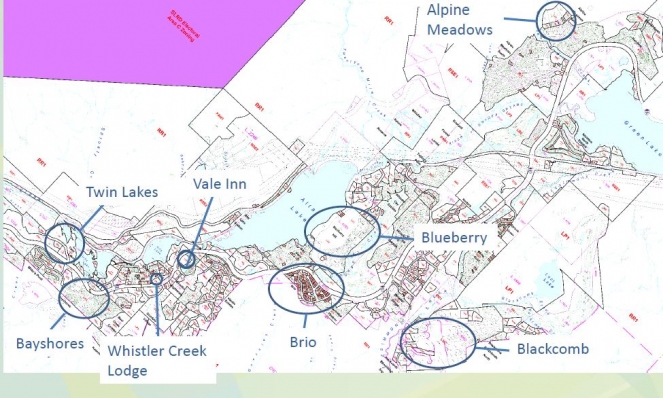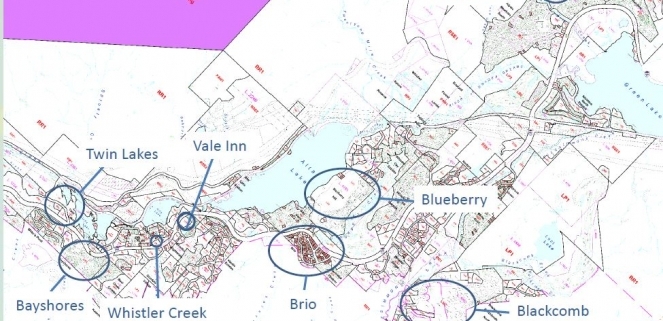Whistler’s LUC (Land Use Contract) Zoning
The information below is provided by the Resort Municipality of Whistler and Pique NewsMagazine.
Land use contracts (LUCs) are contracts entered into between a developer of land and a municipality addressing the use and development of a property. They were used as a regulatory tool from 1970 to 1980.
LUCs, which are similar to zoning regulations, are registered on the title of each property and remain in effect today. Until recently, agreement from both the property owner and municipality was required to amend or terminate a LUC.
A map showing the remaining Land Use Contracts in Whistler that must be rezoned before next year. 
As the provincial government’s 2022 deadline for rezoning Land Use Contracts (LUC) approaches (prior to automatic termination in 2024), the Resort Municipality of Whistler (RMOW) is shifting its approach to phasing out LUCs in the resort.
At its June 1 , 2021 meeting, council endorsed a new streamlined approach for the process.
The RMOW began the process of rezoning its eight LUCs back in 2016, and since then has completed the process for three (in Alpine, Brio and Bayshores).
The five still remaining represent about 2,350 lots and 43 stratas.
With time running out, RMOW staff is looking to streamline the process for introducing the termination bylaws to council by removing the first step (seeking permission to proceed from council).
RMOW staff estimate removing the “permission to proceed” step will save about 150 hours of staff time and shorten the processing time for each remaining LUC file by one month.
Without the first step, staff will now prep a draft of the LUC-terminating bylaw; distribute it with an accompanying letter to owners of affected properties; give one month for owners to respond; review comments and make revisions as required; and introduce the bylaw to council for consideration of first and second readings.
Following that, a public hearing would be held prior to third reading and adoption.
To date, staff has proposed a “like-for-like” approach to the zoning that replaces an LUC, meaning most owners won’t notice a change to what’s already in place.
“Should staff recommend proposed zoning with significant differences from the like-for-like principle, staff propose to seek permission from council to proceed in advance of any communication with registered owners,” said planner Courtney Beaubien in a presentation to council.
To further speed up the process, the RMOW will send a letter to the Ministry of Transportation and Infrastructure advising of Whistler’s remaining LUCs, and advising the province that: “The replacement zoning will not change the current land use, or increase development within the [LUC] area,” Beaubien said.
As some of the existing LUC parking requirements differ from the RMOW’s current zoning and parking bylaw, staff is recommending that parking in the replacement zoning reflect the municipal bylaw, she added.
“In particular, [municipal zoning] may require more parking and loading spaces in each LUC, or it may require less,” Beaubien said.
“Staff are recommending that parking reflect the current zoning requirements to bring consistency and clarity to the zoning that will replace the LUCs.”
Where the parking requirements in the replacing zoning are more than what’s described in the current LUC, the existing parking would become legally non-conforming.
“For existing uses, the parking would not need to be updated should the termination bylaw require more parking than is currently within the particular [LUC],” Beaubien said.
Should council adopt any of the upcoming LUC termination bylaws, written notice will be provided to affected owners, who then have a right to apply to the Board of Variance for an exemption to the early termination.


